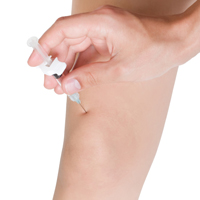

Corticosteroid shots can give relief for RA. Find out more about joint injections and RA, including risks, side effects, and how long you might expect relief to last.

New drugs generally do a good job of controlling inflammation caused by rheumatoid arthritis, or RA, but they're not perfect. "Occasionally, someone with RA will have a joint that resists treatment and remains swollen and doesn’t function properly," says Patience H. White, MD, vice president of public health at the Arthritis Foundation and a professor of medicine and pediatrics at George Washington University School of Medicine and Health Sciences in Washington, D.C. In that situation, doctors may suggest a steroid injection into your joint. The fingers, wrist, and knee are the most common areas to get a joint injection when you have RA. "However, any joint can be injected," Dr. White says.
Joint Injections and RA
"Steroids are a fantastic, powerful anti-inflammatory medication," White says. Though steroids are available in pill form or as an injection, injections work faster. If a particular joint is bothersome, getting an injection in that area instead of taking an oral steroid will decrease inflammatory cells in the joint, as well as address swelling, she says.
The most commonly used anti-inflammatory medications for joint injections are corticosteroids, such as methylprednisolone and triamcinolone. These agents slow down the inflammation in the joint and the resulting joint pain.(Hyaluronic acid joint injections, such as Hyalgan or Synvisc, do not address inflammation and are approved only for people with osteoarthritis. RA is a much different type of arthritis that requires a powerful anti-inflammatory medication.)
However, White adds, you need to be judicious about joint injections and RA, especially when several joints are swollen and painful at once. Ask your arthritis specialist to review your medical regimen with the goal of decreasing the pain, the number of joints involved, and the level of inflammation in those joints.
Steroids and RA: Proceed With Caution
Relief may come with a downside. Every time a joint gets a steroid injection, there's the chance of infection, and that risk increases with each injection in that joint. Infections caused by joint injections are quite rare, however, occurring in fewer than 1 in 15,000 corticosteroid injections.
More important, though, is that if you might already have some kind of infection, you shouldn’t get a steroid injection, warns Scott Zashin, MD, a clinical professor of medicine in the division of rheumatology at the University of Texas Southwestern Medical School in Dallas. Injections should also be avoided if you have any type of skin condition, such as psoriasis or eczema, where the injection will be given.
Side effects of steroid injections, although uncommon, include a permanent thinning of the skin where the steroid was injected. From a cosmetic standpoint, this can be bothersome to some people. Other side effects include a weakening of the tendons and loss of skin color, Dr. Zashin says.
A joint or muscle can be injected with steroids up to three times a year. After several injections, your doctor should consider another type of treatment because of the side effects of steroid injections and the increased risk of infection.
Relief…But for How Long?
The length of time that a steroid injection is effective varies from person to person. "Hopefully, it will be several months," White says. If RA goes into remission (a state in which disease activity is low and symptoms are few), steroids may not be needed again for a long time.
However, in people having difficulty keeping their RA under control, a joint injection may bring relief for only a week or two, and "then you may feel even more pain before the pain resolves," White says. She also advises that you should "stay in close contact with the doctor who gave the injection to make sure the pain you're experiencing is not from an infection."
Copyright © www.orthopaedics.win Bone Health All Rights Reserved